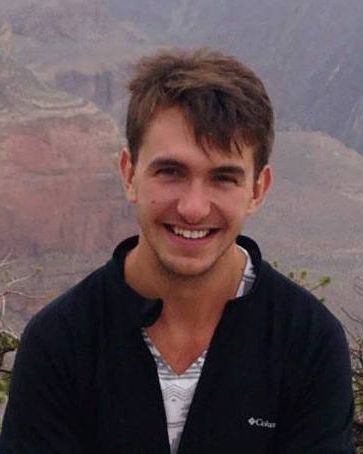Alexander Fokas

Alexander Fokas
Member of Selwyn College
PhD student in Dr Chin's group
Office: 524 Mott Bld
Phone: +44(0)1223 3 37459
Email: asf40 @ cam.ac.uk
TCM Group, Cavendish Laboratory
19 JJ Thomson Avenue,
Cambridge, CB3 0HE UK.

Research
The process of photosynthesis, in general, is well understood. However, the remarkably high efficiency of some light harvesting complexes (LHCs), such as the roughly 100% yield displayed by the Fenna-Matthews-Olson (FMO) complex, requires a deeper understanding of the mechanisms employed to transport the suns energy and convert it into chemical energy. We have found evidence for functionally relavent motions that we believe help elucidate how the FMO complex is able to preserve quantum coherence in a noisy environment. The identified correlations suggest that the pigment conformal motions remain in unison through slow correlated fluctuations managed by secondary structure elements. The results suggest that FMO uses three main levels of structural organisation to reduce mobility and constrain the conformations of the protein to ones that support coherent EET. These results were published in Photosynthesis Research (see Featured Publications). Further work will involve quantum mechanical simulations that aim to deepen our knowledge of the protein environments effect on the energy transfer cascade. This work is being conducted with Dr. Daniel Cole, Dr. Alex Chin, and Dr. Nicholas Hine.
More recently I have been working with Dr. Sebastian Anhert to identify an efficient technique to abstract the protein structure, which is known to be deeply intertwined with their function. This work combines non-covalent interaciton prediction with aspects of network theory. In the future I hope to become involved with functionalising DNA as a method for building light harvesting complexes, which harnesses the ability to design DNA structures using the simple Watson-Crick base pairing rules.

In Plain English
"Those who are inspired by a model other than Nature, a mistress above all masters, are laboring in vain" -Leonardo daVinci
There is an urgent need to find alternative sources of energy to both meet a threefold increase in energy demand this century, and to mitigate climate change effects. As a consequence, the concept of Artificial Photosynthesis is rapidly gaining momentum. We propose a conceptually unique form of Artificial Photosynthesis based on photosynthesis as programmable computation, implementable through Living Software on a ‘metabolic material’. This would empower researchers with the ability to harvest light and convert it to directly usable energy. This project focuses on succesful light harvesting systems found in Nature on which artificial systems can be modelled.